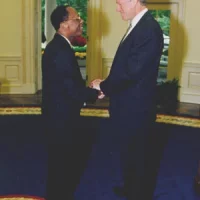The neutron bomb, a low-yield thermonuclear weapon which would be especially lethal to enemy ground troops but would not seriously damage buildings, became the focus of international controversy when the U.S. and a few others had proposed deploying the weapon in Western Europe to counter the Soviet threat. Many NATO countries were unwilling to accept… Read More "The Neutron Bomb — A Negotiating Dud"
The Marooned Law of the Sea Treaty
The Law of the Sea Treaty (formally known as the Third United Nations Convention on the Law of the Sea, or UNCLOSIII) is a 17 part agreement which was adopted in 1982 and which establishes a comprehensive set of rules governing oceans. Specifically, it defines the rights and responsibilities of nations regarding their use of the… Read More "The Marooned Law of the Sea Treaty"
The Panama Riots of 1964: The Beginning of the End for the Canal
When President Theodore Roosevelt signed the Hay-Bunau-Varilla Treaty with Panama in 1903, the United States gained sovereignty over the portion of the newly formed country of Panama which would become the Panama Canal, a modern-day marvel that revolutionized international shipping and solidified America as a global power. While the benefits to the U.S. were enormous, the politics… Read More "The Panama Riots of 1964: The Beginning of the End for the Canal"
Should I Stay or Should I Go? Evacuating Liberia, 1990
Being caught up in violent political upheaval and forced to evacuate is among the risks of diplomatic service, as at the U.S. Embassy in Monrovia in 1990 in what the Marines called Operation Sharp Edge. The problems started a decade before when a group led by Master Sergeant Samuel Doe staged a military coup in Liberia, toppling the… Read More "Should I Stay or Should I Go? Evacuating Liberia, 1990"
The United States found itself embroiled in several interventions in the 1990s that focused on upholding basic human rights standards and encouraging democratic regimes to flourish, from Somalia to the Balkans to America’s own backyard in the Caribbean. Despite Haiti being the second nation in the Western Hemisphere to proclaim independence, it has suffered from… Read More "“The World Was Tired of Haiti”: The 1994 U.S. Intervention"
Sports Boycotts
Sport has often been used throughout history as a political tool. In particular, sport boycotts have been effective measures for countries to express disdain and condemnation for the actions of another. In the last half of the 20th Century, the more famous boycotts were imposed as a response to apartheid policies in South Africa during… Read More "Sports Boycotts"
The U.S. Returns Okinawa to Japan, 1971
In 1945, towards the end of World War II, the U.S. Army and Marine Corps invaded Okinawa with 185,000 troops; a third of the civilian population was killed. After the war, Okinawa became a de facto trustee of the U.S. government, which established several military bases there and on other Ryukyu islands. In addition, the U.S. Civil Administration of… Read More "The U.S. Returns Okinawa to Japan, 1971"
It’s Feng Shui or the Highway: Building the Chinese Embassy in Washington with I. M. Pei
Feng shui seeks to promote prosperity, good health, and general well-being by examining how energy, qi, (pronounced “chee”), flows through a particular room, house, building, or garden. Feng means “wind” and “shui” means water; in Chinese culture, wind and water are associated with good health so that good feng shui means good fortune, and bad… Read More "It’s Feng Shui or the Highway: Building the Chinese Embassy in Washington with I. M. Pei"
Hong Kong Returns to China, Part I
In September 1982, British Prime Minister Margaret Thatcher went to Beijing to begin a dialogue on the issue of Hong Kong, a small nation that had been a colony of Great Britain for over a century. At issue was the 99-year lease which gave Britain authority over the islands was set to expire in 1997,… Read More "Hong Kong Returns to China, Part I"
Evolution of the European Union: Early Seeds of Dissolution?
Britain has always been a part of Europe and yet at the same time, it has seen itself as distinct from the rest of the continent — the English Channel has often proven to be more than just a geographic barrier. However, in the shadow of World War II, as the continent realized the need for greater… Read More "Evolution of the European Union: Early Seeds of Dissolution?"

